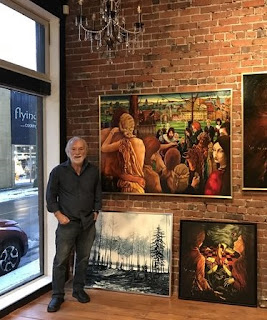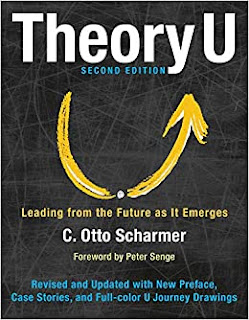“Incredible! You’ll take the lot?” (It became
difficult to conceal my excitement.)
“Yes, everything,” he affirmed. “Since I’m an art collector, and a dealer, I see them all as a great investment. Certainly, (as I’ve been overhearing,) the majority of them are unlike anything one sees locally, and even in Europe these would fetch much attention. Renaissance glazing is almost a lost art. And almost everyone I’ve watched in this exhibition space over the last two days has been mesmerized by the imagery.”
“I wondered why you kept returning,” I beamed. “And here you are again, just as I’d hoped, just before closing time. Just as I’d envisioned, taking everything. Thanks!”
It’d taken me by surprise, having my works in this exhibition. The invitation sprang into action the afternoon before the local Art Walk began. The owner of the empty building, knowing my friend, invited me to use the space. So, Rory arrived, and our two cars were loaded with eighteen of my paintings, as well as hanging tools, an easel, my business cards, and my two novels for display beneath the related painting, (on the cover, of ‘Admission’.) Then too, the gallery owners set up a blurb about me on their website, and the instant exhibition was born. The intensity of it all was deeply absorbing. Over the two days some sixty people popped in. Some stayed longer than others. Several asked questions. And my stories about the paintings got repeated. Each time, like a dramatic performance, I did my best to sustain the import. But not one, no one, made me an offer on any of my works. (Except my dream buyer: “Even if art is disadvantaged by being a luxury item. Then too, many 'have no space on their walls'. Then too, people will often have to pay as much as three times the value of art, ‘just’ to have it framed.”)
Our lives are art works. We sculpt them. We adorn them. We frame the particularities of our own stories into meaningful chunks, and we display them in our language, our habits, our preferences, and our vocations. Some of us are very conscientious about the details. Some of us are highly abstract. Others are a mixture of the surreal, the ontological, and the existential. In our simplicity we naturally go for that which is most comfortable. And hanging there, in the wall spaces of our interiors, the innate art works of our past can be passed by with hardly a glance, (as we often do with the paintings and artifacts presented in our real houses.) We take displays for granted. Imagery is everywhere. Studying it takes effort. It takes an intensity of focus. And since the meaning of imagery is not easily articulated, it is indeed subject to interpretation.
We are right to be subjective. That which appeals to me is for me; you have your own viewpoint. Our preference for agreement is innate too. (“I like this one, don’t you?”) But to own something? Most of us are constrained by our budgets. As such, we are often out there, without a specific list of needs, and something attracts us. It can be the thing we had no idea we wanted at all.
So too for the adventures in our lives. We do not necessarily go searching; they happen to us. From our own reference, we are more comfortable with those who can relate. We nod in affirmation at those also eschewing predestination. We agree with those disagreeing with clear cutting. We beam in recognition of anguish-experienced enlightenment. We chuckle at the symbolic yoking of disparate entities, depicting collaboration. We marvel at history’s lessons, not being learned. “No, life is not cricket!” One is drawn in by the peace within ‘Mornings Missed’.
At least, that last phrase was the exact title of one of my paintings. And the descriptions of life embedded in the preceding paragraph do apply to each of my works. Yet of what matter? They do not adorn other people’s walls. In fact, there was no such benefactor, as depicted herein, at all. No. Nothing sold. Yet one puts one’s intensity of purpose into one’s daily life, and advertises with one’s card, and who knows where such honourably intended seeds may grow? ("Here, do take my card.")

















